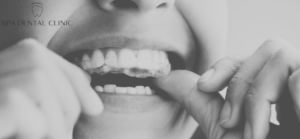Can Dentists See if You Vape? What Vaping Means for Your Oral Health
Vaping has become a popular alternative to smoking, particularly among young adults and those looking to quit traditional cigarettes. But even though vaping is often marketed as a safer choice, it’s not without its risks—especially when it comes to oral health.
Many people wonder, “Can dentists see if you vape?” The short answer is yes. Dentists are trained to spot signs of vaping in your mouth, and the effects on your teeth, gums, and overall health can be noticeable.
This blog will explore how vaping impacts oral health, what dentists look for during check-ups, and why honesty with your dentist is essential to maintaining a healthy mouth.
How Vaping Affects Oral Health
Although vaping is generally thought to be less harmful than smoking traditional cigarettes, it still poses risks, especially to your oral health. Vaping liquids often contain nicotine, flavouring chemicals, and other additives, which can affect your teeth, gums, and overall dental well-being. Let’s break down some of the main ways vaping impacts your mouth.
1. Nicotine and Reduced Saliva Flow
Nicotine, a common ingredient in many e-liquids, has a dehydrating effect on the mouth. Reduced saliva flow can lead to dry mouth, which in turn increases the risk of plaque build-up, cavities, and gum disease. Saliva plays a crucial role in neutralising acids, washing away food particles, and protecting teeth from decay. By reducing saliva, nicotine can set the stage for several oral health issues.
2. Increased Risk of Gum Disease
Nicotine and other chemicals in e-liquids can constrict blood vessels, reducing blood flow to the gums. This lack of circulation can lead to gum recession, making gums more vulnerable to infections and gum disease. Over time, restricted blood flow can slow down the healing process in the mouth, which is a concern if you’re undergoing dental treatments or have any oral injuries.
3. Tooth Discolouration and Staining
Many people assume that vaping won’t stain teeth the way traditional cigarettes do, but this isn’t entirely accurate. While vaping may not cause the same deep yellowing associated with smoking, the nicotine in e-liquids can still lead to surface staining over time. This staining can dull the brightness of your teeth, giving them a yellowish tint that might not be as noticeable but can still impact the appearance of your smile.
4. Increased Risk of Cavities
Vaping liquids, especially those with sweet or fruity flavours, often contain sugar or artificial sweeteners that can stick to teeth and increase the risk of decay. When combined with dry mouth, the risk of cavities becomes even higher. Bacteria thrive on sugars, and if they’re left on your teeth due to reduced saliva, they can produce acids that erode enamel, eventually leading to cavities.
5. Potential for Oral Thrush
Oral thrush is a fungal infection that can develop in the mouth, typically seen as white patches on the tongue and inner cheeks. Vaping can increase the risk of oral thrush, especially if the e-liquid contains sweeteners. The sugary residue from vaping creates a favourable environment for fungi like Candida, the primary cause of thrush, to thrive.
Can Dentists Really See if You Vape?
Yes, dentists can often see signs that you vape, even if you haven’t explicitly told them. Here’s what they look for:
1. Dry Mouth and Dehydration
As mentioned, nicotine reduces saliva production, leading to a dry mouth. Dentists can easily spot signs of dryness, as it affects the overall health of the mouth. Dry mouth also makes plaque and tartar build-up more likely, so a dentist may notice these deposits during your check-up.
2. Gum Health Issues
Dentists can detect gum recession, inflammation, and other signs of gum disease, all of which are more common in people who vape. If your gums appear to be receding or are particularly inflamed, your dentist may suspect that vaping could be a contributing factor.
3. Staining on Teeth
While vaping might not leave as much staining as smoking, regular use can still leave a visible impact. Dentists are trained to notice subtle discolouration that might not be obvious to the untrained eye, and the types of stains associated with nicotine use are generally easy for them to recognise.
4. Increased Plaque and Tartar Build-up
Reduced saliva flow and dry mouth make it easier for plaque and tartar to accumulate on teeth. Dentists regularly check for these deposits during cleanings, and they know that vaping can lead to increased plaque levels. If they see a higher-than-usual build-up, it may be a sign of vaping or other habits that impact saliva production.
5. Signs of Oral Thrush
Dentists are also on the lookout for signs of infections like oral thrush. If you have white patches in your mouth or on your tongue, this could be a sign that you’re more susceptible to infections, possibly due to vaping.
Why It’s Important to Tell Your Dentist If You Vape
Honesty is always the best policy when it comes to dental care. Letting your dentist know that you vape allows them to give you the best care and advice tailored to your needs. Your dentist can recommend strategies to minimise the impact of vaping on your oral health, such as increasing hydration, using fluoride treatments, or scheduling more frequent cleanings to counteract plaque build-up.
Being open about vaping also means that your dentist can keep an eye out for specific issues related to vaping, such as early signs of gum disease or oral infections, and treat them before they become more serious problems.
How to Minimise the Impact of Vaping on Your Oral Health
If you choose to vape, there are ways to help protect your teeth and gums:
- Stay Hydrated: Drinking plenty of water throughout the day can help counteract dry mouth and reduce plaque build-up. Aim to sip water regularly, especially after vaping.
- Brush and Floss Consistently: Good oral hygiene is your first line of defence against plaque, tartar, and decay. Brush twice a day with fluoride toothpaste, floss daily, and consider using an antibacterial mouthwash to reduce bacteria in the mouth.
- Use Sugar-Free E-Liquids: Opting for e-liquids without added sugars can reduce the risk of cavities. If you enjoy sweet flavours, try to choose options that use artificial sweeteners instead of sugar.
- Chew Sugar-Free Gum: Chewing gum can stimulate saliva production, which helps counteract the dry mouth effect from nicotine. Sugar-free gum with xylitol is a good choice, as it can help fight bacteria while encouraging saliva flow.
- See Your Dentist Regularly: Regular dental check-ups and cleanings are essential, especially if you vape. Professional cleanings can remove plaque and tartar, and your dentist can monitor for early signs of problems related to vaping.
In Conclusion
Understanding how vaping affects your oral health can help you make informed decisions about your habits. If you vape, knowing when to see a dentist and taking steps to protect your mouth can make a significant difference. Remember, a good dental routine and regular check-ups are essential in keeping your smile healthy and bright.


